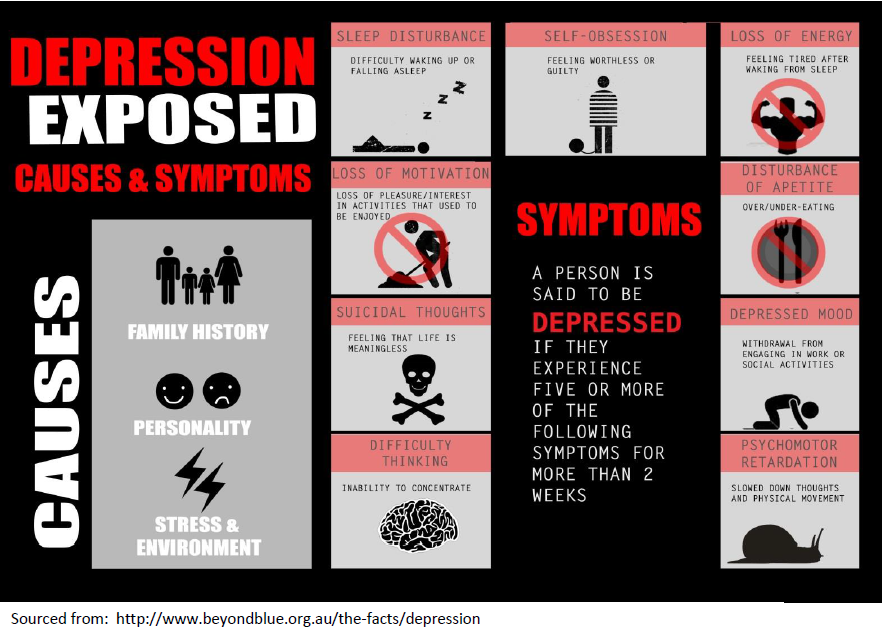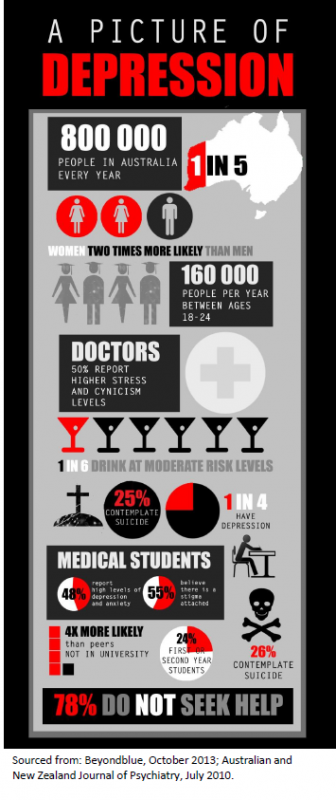The truth behind the style
Story by Alynna Wong
WITTY, creative and in her 3rd year of med school, Laura is an intelligent student with a promising future. So why is she depressed?
A Beyondblue survey of 14,000 medicos has found that one in five doctors has contemplated suicide, one in four has depression or a minor psychiatric disorder and one in six is drinking at moderate risk levels.
For Laura, this bleak picture is only a confirmation of her everyday reality. Highly competitive, stressful, with heavy workloads and long hours, the bid to be the next ‘superhero’ of society is a grueling journey. One that is remarkably lonely.
“It’s not every day medical students, or doctors for that matter, admit they have a mental disorder.” Laura says. “It’s all really hush hush.”
The 24-year old pathology and pharmacology student has been dealing privately with Borderline Personality Disorder (BPD) and Major Depressive Disorder for more than two years. She confesses that “the pressure to remain perfect makes me feel isolated from society”. She is not the only one.
Depression among doctors and medical students is a major issue hidden neatly away in the folds of an exclusive community that most of us are not privy to.
Doctors are so busy saving everybody else’s life that it is easy to forget how vulnerable they can be. A
AMA Queensland President, Dr. Christian Rowan says that “it is important we recognize they are also human beings, susceptible to the same health issues experienced by their patients”.
However, in an environment that has its own rules and cultures, is depression in doctors different from the general public?
Yes and no. According to psychiatrist, Dr. Aw Tui Iar, the causes are similar in both cases but doctors are more reluctant to seek treatment because of their professions.
“Most people hold doctors to a different level of expectation but don’t really understand the pressure it puts on them,” she said.
“Just being involved with health care imposes a standard of conduct that is perilously close to perfection.”
Dr. Rowan agrees.
“It can be difficult for doctors to ask for help because this may be seen as an admission of failure or weakness.”
It must tell you something if people whose lives revolve around health care refuse to personally seek help for what is a treatable illness.
Rather than having a mental illness staining their report, most doctors attempt to treat themselves privately said Tweed Hospital psychiatrist, Dr. Benjamin Hadikusumo.
“There is definitely a stigma attached that tells them not to show weakness if they value their jobs.”
Whether this standard is public or self-imposed, if pushed hard enough, everyone cracks eventually, even doctors. Keeping up appearances is a pressure hitting med students hard, especially those in their clinical years.
Laura confessed that the reason she started writing her blog ‘Borderline Med’, was because she felt like she could not talk to anyone.
“It’s difficult to say something when so many people are proud of you for doing medicine.” Laura says.
When university became the bane of her existence, the inability to talk about her illness became all too real a problem. Even when she did well, she was afraid to feel happy for fear of losing the happy moment; something most people with depression experience.
Always on the outside she maintained her cheerful attitude but on the inside she thought of ways to kill herself.
“I kept asking myself: What is wrong with me? Where is all this pain coming from?” she said.
“It makes me wonder if any other people in my class are in a similar situation and screaming for help silently.”
“I kept asking myself: What is wrong with me? Where is all this pain coming from?”
One other person certainly was. Clarice Wong, a 2nd year medical student admitted that sometimes she felt isolated from society just because she was ‘studying medicine’.
“There is a lot of pressure, not just from others, but from my own faculty,” she said. “I can’t ask for help because it’s all a competition. Only the best finish the race.”
wong 2Encouraging the status quo for doctors who suffer from mental illnesses is a one way road to disaster, both for health care professionals and their patients.
They need to be able to overcome their illnesses positively, instead of suppressing it or turning to desperate measures.
Jennifer Willis, communications director of the Australian Drug Foundation said that “mental health problems are one of the leading risk factors for developing an alcohol or other drug problem in Australia.”
Combined with the university drinking culture, med students are walking a dangerous line.
“If they do not deal with the mental health issues they are experiencing, it can affect their ability to deliver the best care,” Beyondblue CEO Kate Carnell said.
Laura confessed that this was one of her biggest fears as a med student.
“You lose interest in patients,” she said.
“You go to hospital activities and visit patients and wonder what the hell you’re doing. At least for me, I wonder why I’m not focusing on myself, on my recovery, rather than focusing on some other person I don’t even know.”
Beyondblue chairman Jeff Kennett said the survey was a “wake up call to the Australian medical community that more must be done to tackle things such as overwork and discriminatory attitudes”.
If you are depressed, please look for help. “Nobody in medical school wins a prize for toughing it out. By no means does it mean you’re weak. Neither will it affect your career simply seeking help,” Laura says. Quite the contrary, it will probably help you be a better person and your patients will be thankful for it.
It only takes one psychiatrist to change the light bulb, but the light bulb has to want to change.
“We all have a responsibility to change this mindset and let doctors and med students know that it’s ok to admit they’re human,” said Dr Rowan.
If you or anyone you know is suffering from depression, please call Beyondblue at 1300 22 4636.


